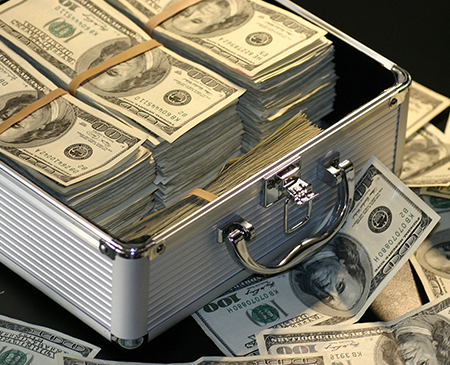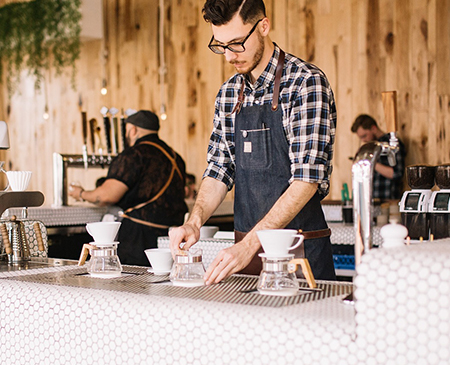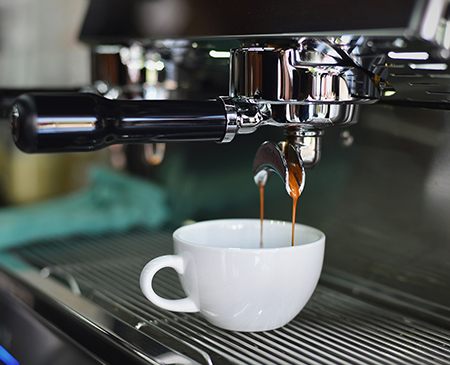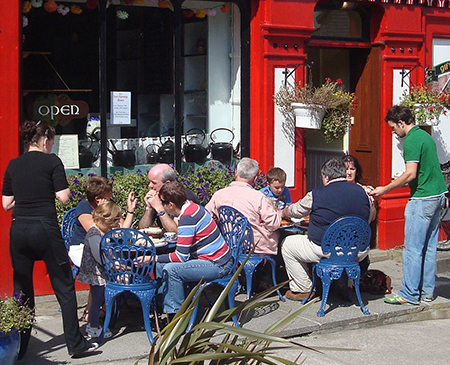Need help determining if a coffee shop is the right business venture for you? Understanding the time, effort, money, and challenges you will face to open a coffee shop will help you determine if this is the right business.
webandprintteam.com gathered the following information and tips on what you will need to successfully open a coffee shop.
What is a Coffee Shop Business?
In the coffee industry (coffee shops are part of the specialty eatery industry), LLCs are common and are recommended by most business experts based on the scale of most coffee businesses. When you form an LLC, you’ll get a straightforward business structure that protects you and separates your personal and business assets through “the corporate veil.”
Note: The corporate veil is crucial in business ownership because it protects business owners, shareholders, and partners by shielding them from paying for corporate debts, liabilities, or lawsuits with their own money or assets.
Steps to Start a Coffee Shop

The following simple steps will help you understand and navigate the requirements and obstacles you may be challenged with when starting a coffee shop:
Step 1 – Business Research
Research will reveal if there is a need for coffee shops in your area, if you can compete with existing locations, and if you can afford to own a commercial business in your area. Pay attention to competitor research and see if coffee shops in your area are franchises or independent.
Note: An independent business may successfully compete with franchises but not with other independent coffee shops.
Step 2 – Concept Development
Your concept is your cafe’s theme, and a well-planned concept will give your business a competitive edge over other area coffee shops. Consider the following:
What is your target demographic? – Do you want to serve gourmet coffee to millennials or appeal to busy office employees and executives?
Will you offer food? – If you want to add food, pastries, or snacks to your menu, where will you source the food (bakery, in-house, etc.)?
What are area customers willing to pay? – If your coffee shop is located in a working-class neighborhood, it may be challenging to persuade customers to pay $5 or $6 for coffee.
Note: Start planning what your menu will look like and determine the decor you want. A strong and well-conceived concept in this stage will help strengthen your coffee shop’s appeal.
Step 3 – Source Your Coffee Beans

Your coffee shop’s identity and popularity will hinge on the coffee you serve. Typically, coffee shops purchase their beans wholesale from a local or regional coffee roaster, You should be specific when seeking a roaster to source your coffee beans. Consider the following when sourcing coffee beans:
Where is the roaster located? – Purchasing from a local roaster is an excellent way to interest customers while supporting local businesses.
Is the coffee fair trade? – Fair trade promotes the ethical pay and treatment of coffee producers. Look for coffee roasters with fair trade certification.
Coffee varieties and flavors – Does the roaster have the types of coffee you want?
Do you like their coffee? If you like the roaster’s coffee, you will find it easier to sell.
Tip: Choose your roaster wisely. High-quality coffee is the most crucial element of running a successful coffee shop.
Step 4 – Develop a Coffee Shop Business Plan
A business plan helps finalize your concept, plan ownership structure, and project finances, create your menu, and lists your competitive research. A coffee shop business plan is necessary when seeking startup funding. You should develop and include the following 7 components:
- Executive Summary
- Company Overview and Description
- Market Analysis
- Services and Products
- Management Plan and Ownership Structure
- Marketing and Advertising Strategy
- Financial Projections
Tip: A business plan can be applied to ongoing business operations by keeping the executive team on the same page for strategic actions and on-task for meeting company goals.
Step 5 – Startup Funding

Starting a coffee shop is costly. You need to secure enough funding to afford the equipment and supplies your business needs and cover operational expenses for the initial 6 to 12 months.
Note: It can cost $100k to $600k (or more) to open a coffee shop, depending on its size and location.
Tip: Seek government-backed loans and funding options at usa.gov/funding-options
Step 6 – Secure Commercial Space
The right commercial space is crucial. A good location will ensure your business sees a steady flow of customers coming in. Complete a location analysis considering the following:
- Area Demographics
- Target Demographic Proximity
- Competition
- Crime Rates
- City and Municipal Regulations and Zoning
When choosing a space, you should consider the neighborhood and the physical space’s attributes.
Step 7 – Get Your EIN
An Employer Identification Number (EIN) is a Federal Tax Identification Number used to identify a business entity. This is a free service offered by the Internal Revenue Service.
For further information, instructions and to apply online, visit – Apply for an Employer Identification Number (EIN) Online
Note: You need an EIN to pay federal taxes, hire employees, open a bank account, and apply for business licenses and permits.
Step 8 – Permits and Licenses
So you’ve decided to open a coffee shop. While you begin developing your marketing plan, business plan, and optimized website, you’ll need to focus on securing the following permits and licenses before serving your first customer:
Business License – Coffee shops need a business license to legally operate in the United States. Your city or county will dictate how to apply for a business license and what will be required to remain in compliance with local zoning ordinances.
Tip: Get started on your city’s website, searching for “business license application.” You may be required to apply at the state level.
Cost: Business licenses typically require an annual flat fee ($50 to thousands of dollars).
“Doing Business As” License (DBA) – You may need a Doing Business As (DBA) license if you plan to operate your coffee shop under a different name than its legally registered name. While DBAs are typically registered with your county clerk, depending on your state, you may be required to register your DBA at the state level.
Cost: DBA license fees typically vary from $10 to $100 or more (your location and business structure determine the cost)
Retail Food Service License – Typically, your state’s department of health or other local public health agency regulates the issuance of retail food service licenses (depending on your location, you may need county and city licensing).
Note: The type of retail food service license you need will depend on if you open a sidewalk cafe, a street cafe, or a mobile coffee shop.
Cost: Retail food service licenses cost $100 and up.
Resale License for Sales Tax – If you are situated in a state that charges sales tax to the end consumer, you may be required to obtain a resale license for sales tax.
Tip: Contact your state’s revenue department for state-specific information and requirements.
Cost: Typically, states do not charge for a resale license. You must keep this license current by filing your tax returns annually and submitting collected sales taxes to the state.
Signage Permit – Every city has a set of requirements for regulating a sign’s size, location, lighting, and visibility.
Tip: Check your city’s website for sign permits, regulations, and application instructions.
Cost: Minimum $50 (will depend on size and location)
Building Health Permit – All restaurants typically need an inspection to prove it is in a sanitary condition and fit to serve food.
Tip: Cities, counties, and states have different requirements for building health permits (avoid surprises by vetting all three).
Cost: $50 to $1,000 (varies by location)

Food Handler’s Permit – Employees must have a food handler’s permit to serve food to your customers, showing they are trained and qualified to serve food.
Tip: Your state’s health department or your county’s health safety office will issue food handler permits. Employees will likely need to complete a food safety course to obtain this permit.
Cost: Approximately $100 per employee (varies by location)
State, County, and City Permits
Except for federal taxes, there aren’t any federal regulations for a coffee shop that you’ll have to worry about (coffee shops aren’t regulated by any federal agency).
According to the US Small Business Administration, the licenses and permits you need from the state, county, or city depend on your business activities and location. Industry requirements often vary by state.
Tip: Visit your state, county, and city’s websites to find out which permits and licenses you need.
Step 9 – Attain Coffee Shop Insurance
It is critical for your coffee shop to have the proper protection against property damage or employee/patron injury. State law typically requires many insurance types for coffee shop owners to carry. Consider the following insurance policies:
General Liability Insurance – General liability covers you (as the owner) if you, your employees, your coffee, or other food products accidentally cause harm to a patron.
Property Insurance – Keep your coffee shop’s interior and exterior covered in case of accidental damage.
Workers’ Compensation – State law typically requires workers’ compensation insurance to protect your employees.
Commercial Auto Coverage – Planning on a mobile coffee shop? Or will you use a company vehicle to transport supplies? If so, you will need a commercial auto policy covering your company vehicle and its operator in case of an accident.
Step 10 – Get Coffee Shop Equipment

High-quality coffee equipment is crucial for your coffee shop to succeed. Consider the following essential coffee shop equipment:
- Coffee Grinder
- Coffee Brewers
- Frothing Pitchers
- Frothing Thermometers
- Airpots
- Espresso Machine
- Hot Water Dispenser
- Reach-in Refrigerator
- Ice Machine
- Display Case
- 3 Compartment Sink
- Tea and Coffee Mugs
- Espresso Cups
- Cup, Lid, and Straw Organizers
- Employee Aprons
Tip: Refer to your business plan when compiling your equipment “shopping list” and invest in whatever your operations require.
Step 11 – Staff Hiring and Training
Consider your management style and whether you want to train “fresh” employees or seek experienced baristas.
Tip: Hire an outside industry professional to train your employees on the finer coffee and brewing aspects. This will save you time that can be invested in other efforts while opening your coffee shop.
Step 12 – Marketing
Before officially opening, advertise your new coffee shop on social media platforms, in local publications, EDDM, and other campaigns to generate interest. Offering discounts, grand opening specials, and customer loyalty plans can encourage customers to visit your coffee shop regularly.
Tip: Your business’ marketing strategy should include multiple ways to reach your consumers; learn how to do this by reading, How To Grow Your Business with Marketing.
Step 13 – Open Your Coffee Shop

After you’ve written your business plan, secured funding, found a location, acquired necessary permits and insurance, and stocked it with equipment and staff, you’re ready to open your coffee shop.
DISCLAIMER: This content is intended for informational purposes only and should not be considered legal, accounting, tax, HR, or other professional advice in any way. You are accountable for your own compliance with local, state, and federal laws and regulations. You should contact a business attorney or other relevant advisor for advice specific to your circumstances.
What You Need to Know to Open a Coffee Shop
In this article, you discovered essential information about what it takes to successfully open a coffee shop and get your piece of the pie in this growing industry.
Knowing the essential requirements and potential pitfalls of starting a coffee shop will help you get your business off to a good start, giving you a clear path to success.
Not knowing the requirements to open a coffee shop will expose you to legal troubles, costly fines, and potential business failure.
Sources:
usa.gov/start-business
sba.gov/business-guide/launch-your-business/apply-licenses-permits
irs.gov/businesses/small-businesses-self-employed/starting-a-business
uagc.edu/blog/how-write-business-plan-step-by-step
